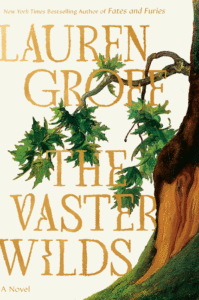5 Book Reviews You Need to Read This Week
"There’s a whiff of desperate masculinity floating through the book, as rank as a Pretoria boys’ locker room"
Our quintet of quality reviews this week features Gary Shteyngart on Walter Isaacson’s Elon Musk, Fiona Mosley on Lauren Groff’s The Vaster Wilds, Julian Lucas on Mohamed Mbougar Sarr’s The Most Secret Memory of Men, William Davies on Naomi Klein’s Doppelganger, and Parul Sehgal on James Ellroy’s The Enchanters.
“Who or what is to blame for Elon Musk? Famed biographer of intellectually muscular men Walter Isaacson’s dull, insight-free doorstop of a book casts a wide but porous net in search of an answer. Throughout the tome, Musk’s confidantes, co-workers, ex-wives and girlfriends present a DSM-5’s worth of psychiatric and other theories for the ‘demon moods’ that darken the lives of his subordinates, and increasingly the rest of us, among them bipolar disorder, OCD, and the form of autism formerly known as Asperger’s. But the idea that any of these conditions are what makes Musk an ‘asshole’ (another frequently used descriptor of him in the book), while also making him successful in his many pursuits, is an insult to all those affected by them who manage to change the world without leaving a trail of wounded people, failing social networks and general despair behind them. The answer then must lie elsewhere. There’s a lot to work with here, but it doesn’t make reading this book any easier. Isaacson comes from the ‘his eyes lit up’ school of cliched writing, the rest of his prose workmanlike bordering on AI. I drove my espresso machine hard into the night to survive both craft and subject matter … To his credit, Isaacson is a master at chapter breaks, pausing the narrative when one of Musk’s rockets explodes or he gets someone pregnant, and then rewarding the reader with a series of photographs that assuages the boredom until the next descent into his protagonist’s wild but oddly predictable life. Again, it’s not all the author’s fault. To go from Einstein to Musk in only five volumes is surely an indication that humanity isn’t sending Isaacson its best … There is a far more interesting book shadowing this one about the way our society has ceded its prerogatives to the Musks of the world. There’s a lot to be said for Musk’s tenacity, for example his ability to break through Nasa’s cost-plus bureaucracy. But is it worth it when your savior turns out to be the world’s loudest crank? … there’s a whiff of desperate masculinity floating through the book, as rank as a Pretoria boys’ locker room … When you are as messed up as our hero, there is a lot of psychological work to be done to stop the downward spiral, work more boring than building a rocket. Work even more boring than this book.”
–Gary Shteyngart on Walter Isaacson’s Elon Musk (The Guardian)
“Groff’s characters are always in search of a better life; she is a writer animated by problems of community and utopian thinking. But in this unnamed 17th-century colony, fear and hunger have bred only violence … Groff’s novels often account for a character’s entire life, propelling the reader through a cascade of keenly articulated, outward-facing presents, rather than cogitations on the past. The Vaster Wilds is much narrower in time frame, taking place over just a few weeks, and more urgent in its objectives. Pursued by threats real and imagined, the girl is driven by a sovereign hunger, and Groff is lyrically, painstakingly attentive to the textures of her craving … A rather lonely novel, yet one shot through with Groff’s perennial interest in the pioneering spirit … A testament to individual struggle. The girl leaves her home behind, but also, like the hermit, her language. As such, the other humans she encounters are largely ephemeral. She is a stranger to them; they are strangers to her. While I found myself occasionally wishing for the humor and vitality of Groff’s previous, heavily populated novels, there is no doubt she has the skill to carry this one-woman show … The girl embodies a furious onward motion, as does the prose. Sentence after sentence, Groff creates luminous, sparely rendered images, the historical setting allowing her to play with cadence and grammar … Some of the best fiction is capacious rather than penetrative, rounded rather than aculeate, holding the abundance of a vessel rather than the violence of, say, a spear. This is the radical vision of The Vaster Wilds.”
–Fiona Mosley on Lauren Groff’s The Vaster Wilds (The New York Times Book Review)

“The Most Secret Memory of Men is an aerobatic feat of narrative invention, whirling between noir, fairy tale, satire, and archival fiction in its self-reflexive meditation on the nature of literary legend. Its Goncourt was seen as a coup in the world of French letters, which had never before conferred its highest recognition on a writer from sub-Saharan Africa … There’s an element of poetic justice in an homage to [Yambo] Ouologuem winning such approbation from the very establishment that discarded him. Sarr witheringly scrutinizes the cultural Françafrique—a word for France’s geopolitical influence over its former colonies—that relegates African fiction to the status of veiled memoir, ethnographic study, or folkloric entertainment. Defying these categories, he delivers a demiurgic story of literary self-creation, transforming the sad fate of an author who stopped writing into a galvanizing tale about all that remains to be written … Fictionalizing literary history can allow writers to exorcise its overbearing presence, to escape its clichés and culs-de-sac. Jorge Luis Borges reviewed imaginary books to overcome the enormous weight of the forebears who obsessed him. Ishmael Reed, in his novel Mumbo Jumbo, tried to free African American writers from their pigeonholes by parodying the archetypal figures of the Harlem Renaissance. Similarly, Sarr borrows from Ouologuem’s life to fashion a new origin myth for his tradition … The Most Secret Memory of Men arrives amid a rupture between France and its former colonies in Africa. A spate of coups across West and Central Africa—in Guinea, Mali, Burkina Faso, Niger, and, most recently, Gabon—have been applauded by crowds expressing their opposition to France’s military and economic influence over the region…Sarr weaves these anxieties into Diégane’s return to Senegal, where he comes to search for Elimane…But in the novel he dutifully cobbles together a vague political crisis far less compelling than the ones in his previous work. It reads like a halfhearted apology for writing a novel about literature rather than current events … literature needs its legends. African literature, perpetually at risk of reduction to testimony, might need them more than most. Sometimes the greatest tribute that authors can pay to their predecessors is simply to continue where they left off.”
–Julian Lucas on Mohamed Mbougar Sarr’s The Most Secret Memory of Men (The New Yorker)
“You may well wonder how such a faintly comical theme can be extended for 350 pages, and what it has to do with Klein’s usual preoccupations of combating corporate capitalism and climate crisis. It is certainly the most introspective and whimsical of Klein’s books to date, but it is also one of surprising insights, unexpected connections and great subtlety. The Klein/Wolf confusion is an entry point to consider wider forms of disorientation that afflict the left, in particular the loss of its monopoly (if it ever had one) over the language of political resistance, and how, in the process, that language has lost its grip on the world … This is a book that offers scant optimism for the future, but if there is hope lingering here, it’s that collective self-reflection—through historical knowledge and organizing—offers political resources that solitary self-reflection never will. True to form, Klein’s ultimate message is log off and get on to the streets.”
–William Davies on Naomi Klein’s Doppelganger (The Guardian)
“To pick up a James Ellroy novel in the year 2023 is to know the score. We…do not arrive expecting much in the way of lavish scene-setting, characters who confound us with complexity, or commas. We are here for the short, stabby sentences and percussive rhythms. Stories are sheared down to bare-bones plot, almost stage directions, almost, at times, demented square-dance calls … Beyond the syntax, beyond the quick, greasy fun, there’s a world view shaped by personal tragedy … What does it mean to embrace such men? For Ellroy, this is literary vision—to see the world for what it is, to love it as it is without flinching, and to see yourself in the same way. In effect, it means that he can never fully abandon his psychosexual plots; they burn at the core of everything he writes … Repetitiveness, this obstinacy, is a distinctive feature of Ellroy’s writing. His fiction, at its most potent, is driven less by plot than by ritual. He has been canonized and censured; he writes now, in his mid-seventies, on a plane beyond the exigencies of either, enjoying a rare kind of freedom … Marilyn remains fragmented and removed, strips of celluloid; it’s only Freddy whose body heat we feel … The Enchanters, which takes place during L.A.’s August heat, is at once panting and sluggish … What it feels we are left with—the ribs and spine of a book, delivered with strange weariness … But, for all the novel’s exasperations, its author’s talent for mayhem still has its charms.”
–Parul Sehgal on James Ellroy’s The Enchanters (The New Yorker)
























